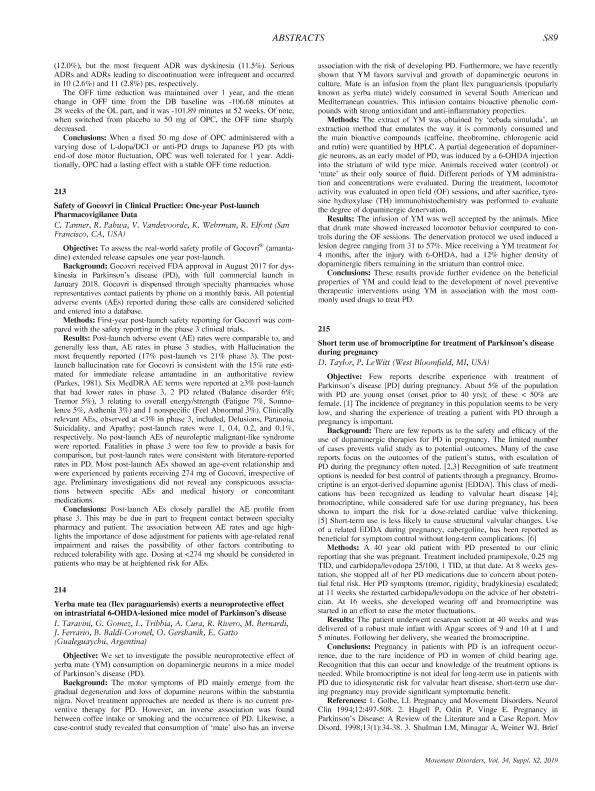Evento
Yerba mate tea (Ilex paraguariensis) exerts a neuroprotective effect on intrastriatal 6-OHDA-lesioned mice model of Parkinson’s disease
Taravini, I. R. E.; Gómez, G.; Tribbia, Liliana Teresita ; Rivero, R. C.; Bernardi, M. A.; Ferrario, J. E.; Baldi Coronel, B. M.; Gershanik, O. S.; Gatto, E. M.
; Rivero, R. C.; Bernardi, M. A.; Ferrario, J. E.; Baldi Coronel, B. M.; Gershanik, O. S.; Gatto, E. M.
 ; Rivero, R. C.; Bernardi, M. A.; Ferrario, J. E.; Baldi Coronel, B. M.; Gershanik, O. S.; Gatto, E. M.
; Rivero, R. C.; Bernardi, M. A.; Ferrario, J. E.; Baldi Coronel, B. M.; Gershanik, O. S.; Gatto, E. M.
Tipo del evento:
Congreso
Nombre del evento:
3rd Pan American Parkinson's Disease and Movement Disorders Congress
Fecha del evento:
14/02/2019
Institución Organizadora:
International Parkinson and Movement Disorder Society Pan American Section;
Título de la revista:
Movement Disorders
Editorial:
John Wiley & Sons Inc
e-ISSN:
1531-8257
Idioma:
Inglés
Clasificación temática:
Resumen
Objective: We set to investigate the possible neuroprotective effect of yerba mate (YM) consumption on dopaminergic neurons in a mice model of Parkinson’s disease (PD). Background: The motor symptoms of PD mainly emerge from the gradual degeneration and loss of dopamine neurons within the substantia nigra. Novel treatment approaches are needed as there is no current preventive therapy for PD. However, an inverse association was found between coffee intake or smoking and the occurrence of PD. Likewise, a case-control study revealed that consumption of ‘mate’ also has an inverse association with the risk of developing PD. Furthermore, we have recently shown that YM favors survival and growth of dopaminergic neurons in culture. Mate is an infusion from the plant Ilex paraguariensis (popularly known as yerba mate) widely consumed in several South American and Mediterranean countries. This infusion contains bioactive phenolic compounds with strong antioxidant and anti-inflammatory properties. Methods: The extract of YM was obtained by ‘cebada simulada’, an extraction method that emulates the way it is commonly consumed and the main bioactive compounds (caffeine, theobromine, chlorogenic acid and rutin) were quantified by HPLC. A partial degeneration of dopaminergic neurons, as an early model of PD, was induced by a 6-OHDA injection into the striatum of wild type mice. Animals received water (control) or ‘mate’ as their only source of fluid. Different periods of YM administration and concentrations were evaluated. During the treatment, locomotor activity was evaluated in open field (OF) sessions, and after sacrifice, tyrosine hydroxylase (TH) immunohistochemistry was performed to evaluate the degree of dopaminergic denervation. Results: The infusion of YM was well accepted by the animals. Mice that drank mate showed increased locomotor behavior compared to controls during the OF sessions. The denervation protocol we used induced a lesion degree ranging from 31 to 57%. Mice receiving a YM treatment for 4 months, after the injury with 6-OHDA, had a 12% higher density of dopaminergic fibers remaining in the striatum than control mice. Conclusions: These results provide further evidence on the beneficial properties of YM and could lead to the development of novel preventive therapeutic interventions using YM in association with the most commonly used drugs to treat PD.
Palabras clave:
YERBA MATE TEA
,
PARKINSON¨S DISEASE
,
NEUROPROTECTION
Archivos asociados
Licencia
Identificadores
Colecciones
Eventos(SEDE CENTRAL)
Eventos de SEDE CENTRAL
Eventos de SEDE CENTRAL
Citación
Yerba mate tea (Ilex paraguariensis) exerts a neuroprotective effect on intrastriatal 6-OHDA-lesioned mice model of Parkinson’s disease; 3rd Pan American Parkinson's Disease and Movement Disorders Congress; Miami; Estados Unidos; 2019; 89-89
Compartir
Altmétricas



